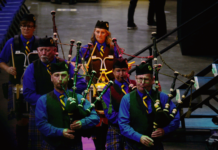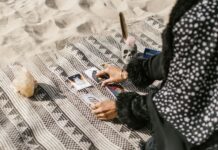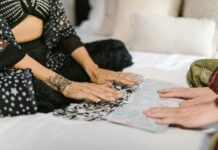It was well past nine when the last train let him off at the downtown station. Ray was the first to disembark, and as he trudged toward the staircase leading over the platforms to the adjacent bus terminal, a crowd — mostly of other students but also young families and commuters — formed behind him.
The students, for their part, were all much the same. They carried bags from department stores in the city, where they had gone in packs to shop over the weekend. Many walked while chatting in little clusters. Others continued silently, looking at their phones.
The others, though, were unique. On the platform Ray noted a couple in their 20s. The woman was short and wore a pink top and rhinestone jeans. In her hands, she held a baby and was visibly agitated. Though Ray could scarcely hear her Spanish over the roar of the train engines, it was clear she was reprimanding her boyfriend. He walked dejectedly beside her, his eyes to the ground, pushing an empty stroller.
So too was there the young man who had spoken to Ray on the train. He was well dressed, with round prescription glasses and a pinstripe long sleeve tucked into corduroys. He carried in his hand a well-worn vinyl of Erik Satie’s “Gymnopedies” bought at a Japantown swap meet. He was eager, therefore, to speak on his love of music, and how the band he was a guitarist for would be playing in town soon — date to be announced.
As Ray climbed the flight of stairs to the bridge he felt his body faltering. He had experienced the first inklings of this fatigue hours before as he had stood silently on the main concourse of the city’s Union Station. At that point it had already been some 16 hours since he had woken up in his childhood bed before the sun had come up. He had returned home for a weekend to visit his family and to dissuade the heavy bout of homesickness that so often accompanies college life. It was a long journey back to the university, and he had carried two heavy bags the entire way. The load was manageable at first, but the hours of travel had taken their toll, and Ray now walked with slow, exhausted steps, wishing to himself that he had left more with his parents.
The bridge was a long structure, encased with railings and glass. It crossed directly over the whole complex, suspended over the tracks. If one were to go halfway down the corridor and looked directly north, one could watch the commuter train make its way through the yard. It would follow the track for a time, before turning in the direction of Moreno Valley, and then Perris, where it would come to a halt for the night. Ray looked out this way, past San Bernardino and toward the mountains on the horizon, but he did not stop to contemplate it. Once his eyes found his reflection in the glass he relented and stared again toward the opposing stairwell.
Hours before, Ray remembered, he had been nowhere near all this. He was on the bus for some time, stopping only once briefly in Buttonwillow. Buttonwillow was a little oasis in the middle of the valley seemingly comprised only of gas stations and fast food, a town so small that it only showed up on maps because it happened to be next to an interstate. The bus had stopped for 30 minutes, so the passengers would have a chance to finally stretch their legs after ages stuck in traffic.
Ray had walked outside for a few minutes, looking for a place to eat. He settled on a cheap burger and fries just across the way. The restaurant was filled with other travelers, as was the parking lot. The line of cars for the drive-thru stretched around the block. But the service was fast, and Ray ate his food feverishly before scurrying back to the awaiting bus.
For a second as he crossed he had been keenly aware of himself, like he rarely was. At that moment he was independent, self-sufficient. It was as if the delayed excitement of newfound adulthood had hit him all at once. Here he was, in the middle of nowhere, with his food, his wits and a way to get home. It was a moment of clarity and of excitement. Ray boarded the bus feeling mindful of everything around him. He was aware of the way the sun shone through the tinted glass of the windows, how the cars snaked up the highway just up ahead and how everything seemed strangely serene in such a desolate place.
The bus departed. The clarity faded as it wound between the mountains and disappeared as it entered an endless sprawl of houses and strip malls and empty business parks. Some hours later, Ray pulled his two bags out of the bus’ luggage compartment and went to stand in a corner in the Union Station. He waited, feeling fatigued, until his last connection appeared on the timetable overhead. He walked to the platform and boarded the train, where he sat again for a lonely couple of hours, drifting in and out of sleep. His phone died finally, and he amused himself by making small talk with a young man sitting in the next row. The man carried an album with him, and apparently was in a band.
With this thought, Ray snapped out from his daydream. He was on the other side of the train platform by now, though he did not remember descending the stairs. He stood at the curb where the local bus would pick him up and finally take him to the university. The crowd of students had subsided, but a few still stood near him, awaiting their ride.
Ray stood staring at the skyline that lay just past the freeway. He thought once again of home, of waking up in a bed he recognized, and then, curiously, of Buttonwillow.
In the distance, the bus at last came into view. It was nearly empty, and the others perked up expectantly, ready to board. He watched the vehicle veer around one last corner as it approached. Though his body ached from the scope of his day, he stood up straight to meet it. Surely, he thought, it would not be much longer.








